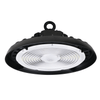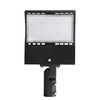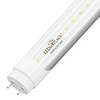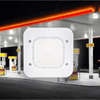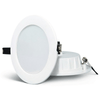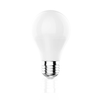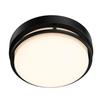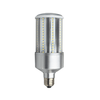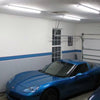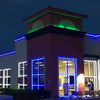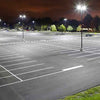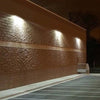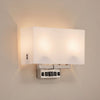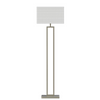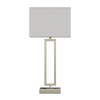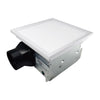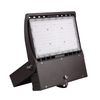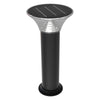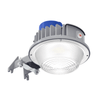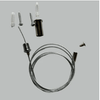Parking lot lights play a crucial role in ensuring safety and visibility in outdoor parking areas. When it comes to illuminating parking lots, LED lights have emerged as a popular and energy-efficient choice. In this article, we will explore frequently asked questions about LED parking lot lights to help you make informed decisions for your parking facility.
1. What are LED parking lot lights?
LED parking lot lights are lighting fixtures specifically designed for outdoor parking areas. They utilize Light Emitting Diodes (LEDs) as the light source, offering significant advantages over traditional lighting options. LED lights are known for their energy efficiency, longevity, and superior brightness.
2. Why are LED parking lot lights important?
LED parking lot lights are essential for several reasons. First and foremost, they enhance safety and security in parking lots by providing adequate illumination. Well-lit parking areas deter criminal activities and promote a sense of security for both vehicle owners and pedestrians. Additionally, LED lights improve visibility, making it easier for drivers to navigate through the parking lot and locate their vehicles.
3. How do LED parking lot lights save energy?
LED parking lot lights are highly energy-efficient compared to conventional lighting technologies. They consume significantly less electricity while delivering the same or even higher levels of brightness. LED lights achieve this efficiency by converting a higher percentage of electrical energy into visible light, minimizing wasted energy in the form of heat. This translates into reduced energy consumption and lower electricity bills.
4. What is the lifespan of LED parking lot lights?
LED parking lot lights have an impressive lifespan compared to traditional lighting options. On average, LED lights can last up to 50,000 to 100,000 hours or even more, depending on the quality of the fixture. This longevity is significantly higher than that of traditional lights, such as high-pressure sodium (HPS) or metal halide (MH) lamps, which typically last around 10,000 to 20,000 hours. The extended lifespan of LED lights not only reduces the frequency of replacements but also lowers maintenance costs.
5. How bright should parking lot lights be?
The brightness requirement for parking lot lights depends on various factors, including the size of the parking lot, the layout, and the intended purpose. As a general guideline, it is recommended to achieve an average illuminance level of around 5 to 20 foot-candles (fc) for parking lots. However, specific lighting standards and regulations may vary based on the location and intended usage of the parking facility.
6. How do LED parking lot lights reduce maintenance costs?
LED parking lot lights offer significant cost savings in terms of maintenance. Due to their long lifespan, LED lights require less frequent replacements compared to traditional lighting options. This not only reduces the cost of purchasing new fixtures but also minimizes the labor and downtime associated with maintenance activities. Furthermore, LED lights are sturdier and more resistant to shock and vibrations, making them less prone to damage and requiring fewer repairs.
7. Are LED parking lot lights environmentally friendly?
Yes, LED parking lot lights are considered environmentally friendly for several reasons. Firstly, LED lights consume less energy, resulting in lower greenhouse gas emissions and reduced dependence on fossil fuels. Additionally, LED lights do not contain hazardous substances such as mercury, which is commonly found in older lighting technologies. Lastly, the long lifespan of LED lights means fewer materials are consumed over time, reducing the overall environmental impact.

8. What are the different types of LED parking lot lights available?
There are various types of LED parking lot lights available to cater to different needs and preferences. Some common options include shoebox lights, floodlights, wall-mounted fixtures, and pole-mounted lights. Each type offers distinct advantages in terms of design, light distribution, and mounting options. It is important to consider factors such as the layout of the parking lot, desired lighting pattern, and aesthetic requirements when choosing the most suitable LED parking lot lights.
9. What factors should I consider when choosing LED parking lot lights?
Several factors should be considered when selecting LED parking lot lights. These include the brightness requirement, color temperature, beam angle, CRI (Color Rendering Index), energy efficiency rating, and the warranty provided by the manufacturer. It is also crucial to assess the quality and durability of the fixture, as well as the reputation of the supplier or manufacturer. Considering these factors will ensure you choose LED parking lot lights that meet your specific requirements.
10. How should LED parking lot lights be installed and placed?
Proper installation and placement of LED parking lot lights are crucial to achieve optimal lighting performance. The lights should be positioned strategically to provide even illumination throughout the parking lot without creating shadows or dark spots. Factors such as the mounting height, spacing between fixtures, and the angle of light distribution should be taken into account. It is recommended to consult lighting professionals or follow lighting design guidelines to ensure proper installation and placement.
11. What are some common issues with LED parking lot lights?
While LED parking lot lights are highly reliable, certain issues may arise over time. Some common problems include reduced brightness due to driver failure, color shifting, and poor thermal management. It is important to address these issues promptly to maintain optimal lighting conditions. Regular inspections, cleaning, and preventive maintenance can help identify and resolve any potential problems early on.
12. How can I maintain LED parking lot lights effectively?
Maintaining LED parking lot lights is relatively simple compared to traditional lighting options. Regular cleaning of the fixtures and lenses to remove dust and debris can help maintain optimal light output. Additionally, periodic inspections should be conducted to check for any signs of damage, loose connections, or moisture ingress. It is also recommended to follow the manufacturer's guidelines for maintenance and perform any necessary repairs or replacements promptly.
13. Are there any regulations or standards for parking lot lighting?
Yes, there are regulations and standards in place to ensure adequate lighting in parking lots. These standards often specify the minimum lighting levels, uniformity requirements, and glare control measures. They also provide guidelines for the design and placement of lighting fixtures. It is important to familiarize yourself with the local regulations and industry standards applicable to your area to ensure compliance and optimal lighting conditions.
14. How do LED parking lot lights compare to traditional lighting options?
LED parking lot lights offer significant advantages over traditional lighting options. They are more energy-efficient, have a longer lifespan, and provide better lighting quality. LED lights also have instant-on capabilities, meaning there is no warm-up time required, unlike some traditional lights. Additionally, LED lights can be easily dimmed or controlled, allowing for greater flexibility in managing lighting levels and reducing energy consumption.
15. Where can I purchase LED parking lot lights?
LED parking lot lights can be purchased from various sources, including local lighting suppliers, electrical wholesalers, and online retailers. It is important to choose a reputable supplier or manufacturer that offers high-quality products, provides warranty coverage, and has positive customer reviews. Consulting with lighting professionals or seeking recommendations from industry experts can also help in selecting reliable sources for LED parking lot lights.
In conclusion, LED parking lot lights are an excellent choice for illuminating outdoor parking areas. They offer numerous benefits, including energy efficiency, longevity, and enhanced visibility. By considering factors such as brightness requirements, installation guidelines, and maintenance practices, you can ensure optimal lighting conditions in your parking facility while reducing energy costs and environmental impact.
16. Are LED parking lot lights more expensive than traditional lighting options?
The initial cost of LED parking lot lights may be higher compared to traditional lighting options. However, the long-term cost savings in terms of energy efficiency and reduced maintenance outweigh the initial investment. LED lights offer significant cost benefits over their lifespan.
17. Can LED parking lot lights be retrofitted into existing fixtures?
Yes, in many cases, LED parking lot lights can be retrofitted into existing fixtures. Retrofitting involves replacing the existing light source with an LED module or lamp. This can be a cost-effective way to upgrade the lighting system and take advantage of the benefits of LED technology without the need for complete fixture replacement.
18. Do LED parking lot lights require a professional installation?
While it is recommended to seek professional assistance for the installation of LED parking lot lights, some fixtures come with user-friendly installation options. However, it is important to ensure that electrical connections are made correctly and that all safety guidelines are followed during installation.
19. Can LED parking lot lights be dimmed?
Yes, many LED parking lot lights come with dimming capabilities, allowing for adjustable lighting levels. Dimming can be beneficial for energy savings and creating different ambiance requirements. However, it is essential to choose dimmable fixtures and compatible dimming controls for proper functionality.
20. Are there any incentives or rebates available for switching to LED parking lot lights?
In some regions, there may be incentives or rebates offered by energy companies or government organizations to encourage the adoption of energy-efficient lighting, including LED parking lot lights. It is advisable to check with local authorities or energy providers to determine if any incentives or rebates are available in your area.





